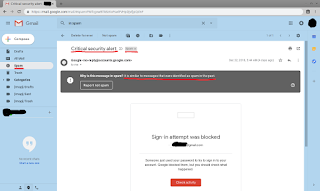Showing posts with label Google. Show all posts
Showing posts with label Google. Show all posts
Thursday, December 27, 2018
Monday, September 16, 2013
Another Blogger Bug: In order to select an item from your on-line storage, please sign in
In a comment on my previous Blogger-mess-related post, Blogger Error "You have logged out from another location...", Blogger user Miyaka reported another "curious behavior" of the world's most popular blogging platform operated by the world's largest Internet company. Less than two days later, I was experiencing the same problem myself.
I must say that these Blogger glitches are getting really annoying.
I must say that these Blogger glitches are getting really annoying.
Monday, September 9, 2013
Blogger Error: You have logged out from another location...
A couple of hours ago, I was hit by the infamous "You have logged out from another location. Do you want to log in again?" error on Blogger, which, as it turned out, has been known since at least September 2012 (see this "known issue").
Saturday, September 7, 2013
Describing Package Tours With Schema.org: Too Much Pain, Too Little Gain... If Any
Since I published some of my (mostly positive at that point) thoughts about structured data embedded in web pages in general and schema.org in particular (see Tour Shopping on the Web: the... Bad and the Ugly and Chicken Thighs, SEO, Structured Data... and More), I have been asked many times by quite a few tour industry professionals whether implementing schema.org mark-up on their sites is something they should consider.
If you want a short answer, it's in the title.
Below is a longer, minimally technical, answer. I may focus on the more technical aspects in another post when and if I have the time.
If you want a short answer, it's in the title.
Below is a longer, minimally technical, answer. I may focus on the more technical aspects in another post when and if I have the time.
-
First, let me explain the following:
-
In order to test the benefits of schema.org markup for a web site of a small independent tour operator, a real web site was created. Real tours with very detailed itineraries and programs were developed.
-
The site was run without schema.org markup for about two months, i.e. long enough for it to be fully indexed and start showing consistently in search results.
-
After that, it was marked up with microdata using schema.org vocabulary and run that way for over five months (it takes a long time for Google to discover and "digest" embedded structured data).
-
Below are some of the results of the test described as "non-technically" as possible.
Labels:
Google,
Schema.org,
search bias,
SEO,
structured data,
tourism
Thursday, December 27, 2012
Tour Shopping on the Web: the... Bad and the Ugly
Back in 1994, when I started hand-coding my first big web site about the tourist resources of a certain European country, we browsed the Web, literally. Web masters created web sites "by hand" (using a plain-text editor). They manually added hyperlinks between pages and to other sites (creating the "web effect"). They submitted their sites to a handful of web resource directories/catalogs, which were also compiled and maintained "manually". The number of web sites was, by today's standards, microscopically small, but even back then many realized that maintaining catalogs of web resources manually, as well as finding information on the Web by actually browsing the Web, would soon become impossible. A few short years later, there was a whole bunch of search engines available. We stopped browsing the Web and started browsing search results.
Labels:
Google,
Schema.org,
SEO,
structured data,
tourism
Sunday, December 16, 2012
Chicken Thighs, SEO, Structured Data... and More
Let's run a simple experiment. Imagine that you have some chicken thighs in your refrigerator. You are not much of a cook, but you are willing to try. So, you do what most of us do looking for answers to all kinds of questions - search the Web. Don't worry - the experiment doesn't involve actual cooking :-)
Labels:
Google,
Schema.org,
SEO,
structured data
Wednesday, June 27, 2012
Google Voice for Android: Another Crappy Update from Google
Google Voice version 0.4.2.54 (on the phone displayed as 40254) for Android version 1.6 is broken.
Labels:
Android,
bugs,
Google,
software testing
Friday, November 25, 2011
Ungraceful Degradation
Today, I was messing with the ubiquitous "Like", "+1", "InShare", and "Tweet" buttons. The "Tweet" button is the only one that degrades gracefully to a hyperlink if JavaScript is disabled. The others just disappear.
I wonder if Facebook, Google, and LinkedIn have even tested their buttons under those conditions. Or, maybe, they are "crappy by design". Either way, Facebook, Google, and LinkedIn got a "minus one" from me today.
I wonder if Facebook, Google, and LinkedIn have even tested their buttons under those conditions. Or, maybe, they are "crappy by design". Either way, Facebook, Google, and LinkedIn got a "minus one" from me today.
Labels:
Facebook,
Google,
LinkedIn,
social networks,
software testing
Subscribe to:
Posts (Atom)

